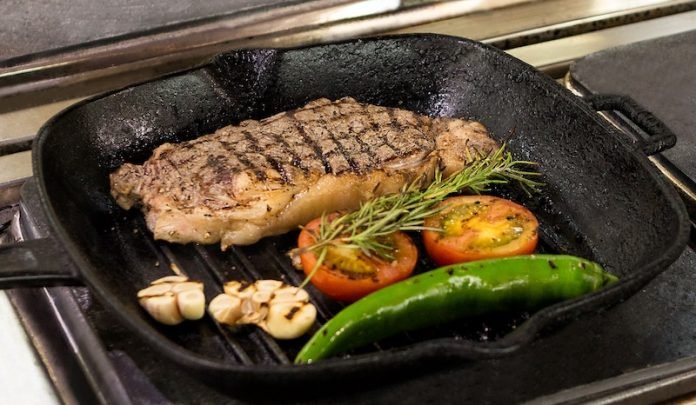
Scientists from the University of Southern California found that cooking red meat at high temperatures, especially pan-frying, may increase the risk of advanced prostate cancer by as much as 40 percent.
The research is published in the journal Carcinogenesis and was conducted by Mariana Stern et al.
Previous studies have emphasized an association between diets high in red meat and the risk of prostate cancer, but the evidence is limited.
Attention to cooking methods of red meat, however, shows the risk of prostate cancer may be a result of potent chemical carcinogens formed when meats are cooked at high temperatures.
In the study, the researchers examined pooled data from nearly 2,000 men who participated in the California Collaborative Prostate Cancer Study.
Participants completed a comprehensive questionnaire that evaluated the amount and type of meat intake, including poultry and processed red meat.
Information regarding cooking practices (e.g., pan-frying, oven-broiling, and grilling) was obtained using color photographs that displayed the level of doneness.
More than 1,000 of the men included in the study were diagnosed with advanced prostate cancer.
The team found that men who ate more than 1.5 servings of pan-fried red meat per week increased their risk of advanced prostate cancer by 30 percent.
In addition, men who ate more than 2.5 servings of red meat cooked at high temperatures were 40 percent more likely to have advanced prostate cancer.
When considering specific types of red meats, hamburgers—but not steak—were linked to an increased risk of prostate cancer, especially among Hispanic men.
These findings are a result of different levels of carcinogen accumulation found in hamburgers, given that they can attain higher internal and external temperatures faster than steak.
Researchers also found that men with diets high in baked poultry had a lower risk of advanced prostate cancer, while consumption of pan-fried poultry was linked to increased risk.
Pan-frying, regardless of meat type, consistently leads to an increased risk of prostate cancer.
The same pattern was found in previous research that fish cooked at high temperatures, particularly pan-fried, increased the risk of prostate cancer.
The researchers suggest it is due to the formation of the DNA-damaging carcinogens—heterocyclic amines (HCAs)—during the cooking of red meat and poultry.
HCAs are formed when sugars and amino acids are cooked at higher temperatures for longer periods of time.
Other carcinogens, such as polycyclic aromatic hydrocarbons (PAHs) are formed during the grilling or smoking of meat.
When fat from the meat drips on an open flame, the rising smoke leaves deposits of PAHs on the meat. There is strong experimental evidence that HCAs and PAHs contribute to certain cancers, including prostate cancer.
If you care about cancer risk, please read studies that exercise may stop cancer in its tracks, and vitamin D can cut cancer death risk.
For more information about cancer, please see recent studies that yogurt and a high-fiber diet may cut lung cancer risk, and results showing that new cancer treatment may reawaken the immune system.
Copyright © 2022 Knowridge Science Report. All rights reserved.



